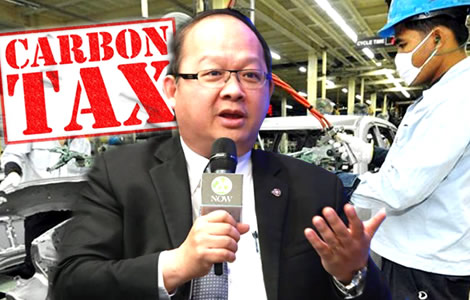Thailand’s manufacturing base is crumbling due to rising costs, loss of competitiveness and technological changes. This week, the government announced a carbon tax on industrial output starting in 2025, aiming to combat climate change despite factory closures and an increasingly challenging economic environment.
Thailand’s manufacturing base is crumbling in the face of increased costs, loss of competitiveness and changing technologies. It is also facing mammoth external factors. Certainly, this includes the US-China trade war and the continual Chinese dumping of cheaper products in Southeast Asia. The upshot is rising factory closures and what appears to be a threat to the kingdom’s second and third-generation economic base. This week, it emerged that Thai steel manufacturers are currently operating at just 27% of capacity. In addition, two leading Japanese firms announced that they would cease production in the kingdom. The emerging data is increasingly and frighteningly stark. On top of all this, the government announced this week that it is moving ahead with a carbon tax on industrial output to be applied from 2025.

The Federation of Thai Industries (FTI) is warning that more Thai-owned factories are facing closure in 2024.
A combination of higher labour costs, higher ancillary costs such as logistics, and increased competition from China is threatening the kingdom’s industrial landscape.
Federation of Thai Industries (FTI) Chairman certain that factory closures will keep rising in the months ahead as firms continue to fail amid higher costs
This week, Kriengkrai Thiennukul, the Chairman of the body, explained that factory owners were fighting to keep their heads above water.
In 2023, it was reported that 1,700 factories closed in Thailand. This year, that figure is expected to rise.
In particular among small to medium-sized firms fighting for survival.
This news comes despite a small bump in the Manufacturing Production Index (MPI) for April.
The index rose by 3.43%, the first increase in 18 months. However, it was attributed to domestic demand for air conditioners and pet food products.
‘Many factories, including those owned by subcontractors, could not afford to pay workers, while others merged to reduce the number of employees,’ explained Mr Kriengkrai.
Industry leader bemoans the loss of Thailand’s auto industry to other countries including Malaysia which has overtaken Thailand as the ‘Detroit of Asia’
The industry leader, in particular, pointed to Thailand’s disappearing automotive industry as a source of special concern.
‘Thailand recently lost its top ranking for auto exports in Southeast Asia for the first time,’ he disclosed. ‘We cannot be nicknamed the ‘Detroit of Asia’ anymore as Malaysia is replacing us.’
Thailand’s output of cars fell for the first four months of 2024 by 17% year on year, amounting to 518,790 units.
Drivers in Thailand are turning their backs on the EV hype. Sales in April were down further at 18.4% from March
At the same time, the government is betting big on EV manufacturing to signal a new dawn for Thailand.
However, while EV car sales in Thailand were up by 36.3% for the first four months of the year, sales fell sharply in February 2024 by 74% and did not recover in March or April.
At the same time, EV sales in international markets began to lose momentum and market share.
Firms investing in EV car production in Thailand. ฿227 billion committed and ฿88 billion reportedly already spent. The kingdom’s big gamble is in play
The government points to 22 firms investing in EV car production in Thailand. Indeed, it is estimated that ฿227 billion has already been committed, with ฿88 billion spent.
Undoubtedly, the future of EV cars is still up in the air. While 2024 appears to be a bad year, there are signals that 2025 may be better.
A combination of price certainty and more advanced technology is touted as the basis for optimism
There is talk of Thailand becoming a base to export EV cars manufactured by Chinese firms. This would target markets such as the European Union and the United States, where Chinese-made cars face punitive tariffs.
Certainly, that plan is ultimately destined to fail and could further impede Thailand’s exports to the United States.
The latter is the kingdom’s biggest export market and its most profitable, with $58.68 billion in 2023 exports. However, this was down from ฿60.5 billion in 2022 when the kingdom recorded a trade surplus with the US of ฿41.9 billion. In short, it imported ฿18.6 billion from America.
Fears that EV cars may go the same way as solar panels
A key source of concern for these offshoring plans being pursued by China in Thailand is the solar panel industry.
Last week, a Chinese-owned firm, Trina Solar Co., suspended manufacturing in Thailand. This came after the Biden administration let an exemption for the kingdom lapse.
The country was added, with others, to China and therefore became subject to a range of punishing US tariffs. The other countries, such as Vietnam, were also affected.
These tariffs were introduced even before the US-China trade war by the Obama administration. They were a response to overt Chinese efforts to subsidise the industry and flood international markets using offshore production bases.
Lack of coherence in government policy is the root cause of Thailand’s massive economic problems
Disturbing questions that must be confronted over Thailand’s reeling economy are China and EV cars
Today, the same story applies to EV production and other products such as steel and consumer goods emerging from China.
Thailand facing new difficulties in exporting to China as Beijing increasingly deploys a ‘war-driven’ economy based on more self-reliance and autonomy
At the same time, Thailand is encountering increased difficulties in exporting products and goods to China.
The Communist Party has instituted a policy of self-reliance as the kingdom’s economy has become linked to what is increasingly seen as a ‘war-driven’ economy.
This is particularly true with industrial or critical products such as technology or oil.
Indeed, this mix of politics and economics has resulted in the gradual process towards decoupling.
Certainly, between the US-led Western economy and China. In turn, this has left Thailand’s manufacturing base decimated.
Last week, the Vice Chairman of the Iron and Steel Industry Club of the Federation of Thai Industries (FTI) sounded another warning.
Country’s steel production sector has plummeted to a historic low of 27% utilisation as Chinese firm applies to build a new giant-sized plant in Rayong
Nava Chantanasurakon says steel output in Thailand is plummeting. Shockingly, factory utilisation has hit a historic low of 27%.
Not only are steel manufacturers suffering from a fall in car output, but they are also contending with massive Chinese dumping of cheaper steel in Thailand and across Southeast Asia.
India-owned Thai steel manufacturer Tata Steel (Thailand) Plc has also sounded the alarm. It says Chinese steel is flooding the market as demand in China slows because of the country’s declining manufacturing activity.
Additionally, Mr Nava expressed concern about a Chinese firm building a huge plant in Thailand. The kingdom’s current consumption of steel is 16,000 tonnes per annum.
A new plan proposed by Xin Ke Yuan Steel in Rayong would generate 6 million tonnes per annum alone.
The proposal for a hot-rolled steel factory in the province is currently with the Board of Investment (BOI). The Chinese firm is seeking tax benefits and other incentives.
‘The Board of Investment is considering approving its investment plan. Approval of the plan would affect local steel manufacturers,’ explained Mr Nava.
Suzuki and Subaru cars to exit Thai manufacturing sector. Announcements come at the same time as the country’s traditional (ICE) automotive sector declines
In the meantime, the Suzuki Motor Company, this week, announced the closure of its factory in Rayong. Employing up to 250 people, the factory was established in 2023. Previously, it had manufactured up to 60,000 vehicles per year for export.
Certainly, it now appears that the decline in internal combustion (ICE) car manufacturing in Thailand has begun.
The factory will close at the end of 2025. The news followed a similar announcement from Subaru in Thailand that it was ceasing manufacturing cars in the kingdom in the course of 2024.
Output at the firm’s facility in Bangkok will cease on December 30th. It had manufactured up to 6,000 cars a year after opening in 2019.
The news comes as Thailand’s GDP projections for 2024 are already falling.
Analysts at Krungsri Kompass have already reduced projected growth in 2024 to 2.3%. In short, it is predicting only a 0.5% growth in exports. This follows a contraction in output from the country in 2023 of 1.7%.
Government to introduce a new carbon tax on output as Climate Change policy shifts from voluntary measures by industry to government-driven compliance mode
Notwithstanding this, the Thai government is pressing ahead with plans to introduce a carbon tax on industrial output in 2025. It comes amid a raft of measures which will move climate change policy from voluntary measures to compliance mode.
The tax, at ฿200 per metric tonne of emissions, is to be applied to products across the board. It will be particularly expensive for old-fashioned internal combustion engine cars and is designed to encourage a move towards increased climate change awareness in business.
This week, the new tax was unveiled by Ekniti Nitithanprapas, the Director-General of the Excise Department. He pointed out that Thailand is only the second ASEAN country to introduce such a tax.
Mr Ekniti said the new tax was part of Thailand’s move towards a more environmentally friendly, circular economy.
Lower tax rate on batteries that are sustainable
He anticipated that the lower tax rate would be applied to battery-powered cars that are engineered with recycling processes and more eco-friendly production systems.
The new taxation scheme will be put to the cabinet for approval in the third quarter of the year.
This week, government sources pointed to increased restrictions being imposed by key foreign markets, particularly Europe, to ensure industrial imports are cleaner and more environmentally friendly.
The European Union, for instance, is increasingly using a certification process that differentiates between products. This certification will be linked to the 27-member bloc’s tariff structure.
Join the Thai News forum, follow Thai Examiner on Facebook here
Receive all our stories as they come out on Telegram here
Follow Thai Examiner here
Further reading:
Lack of coherence in government policy is the root cause of Thailand’s massive economic problems
Disturbing questions that must be confronted over Thailand’s reeling economy are China and EV cars
First-quarter GDP growth surprises analysts based on higher tourism and consumer spending growth
Central bank holds interest rates. Economy will grow 2.6% in 2024 as Srettha pushes home ownership
Economy unlikely to grow in first quarter as Thai manufacturing crumbles. Hard choices ahead
New Finance Minister expected in April as economic malaise deepens with downgrades in GDP growth


















